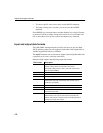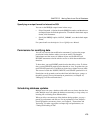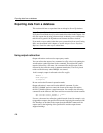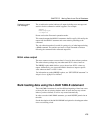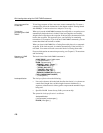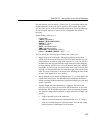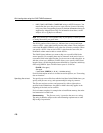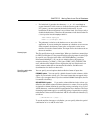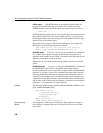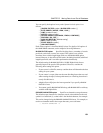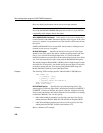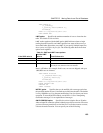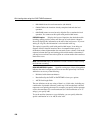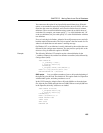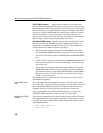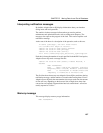
Bulk loading data using the LOAD TABLE statement
180
STRIP option With STRIP turned on (the default), trailing blanks are
stripped from values before they are inserted. This is effective only for
VARCHAR data. To turn the
STRIP option off, enter the clause as follows:
...STRIP OFF ...
Trailing blanks are stripped only for non-quoted strings. Quoted strings retain
their trailing blanks. If you don’t require blank sensitivity, you may use the
FILLER option allows you to be more specific in the number of bytes to strip
instead of just all the trailing spaces.
This option does not apply to ASCII fixed-width inserts. For example, the
STRIP option in the following statement is ignored:
LOAD TABLE dba.foo (col1 ascii(3), col2 ascii(3))
FROM foo_data QUOTES OFF ESCAPES OFF STRIP ON
QUOTES option Currently, you must specify QUOTES OFF. With quotes
off, Adaptive Server IQ does not strip off apostrophes (single quotes) or
quotation marks (double quotes). When it encounters these characters in your
input file, it treats them as part of the data.
With quotes off, you cannot include column delimiter characters in column
values.
ESCAPES option Currently, you must specify ESCAPES OFF. The default
of
ESCAPES ON is provided for compatibility with Adaptive Server
Anywhere; this option may be supported in a future version. With
ESCAPES
turned on, if you omit a column-spec definition for an input field, characters
following the backslash character are recognized and interpreted as special
characters by the database server. Newline characters can be included as the
combination \n, and other characters can be included in data as hexadecimal
ASCII codes, such as \x09 for the tab character. A sequence of two backslash
characters ( \\ ) is interpreted as a single backslash.
Example
The following UNIX example specifies a BLOCK FACTOR of 50,000 records
along with the
PREVIEW option:
LOAD TABLE lineitem
(l_shipmode ASCII(15),
l_quantity ASCII(8),
FILLER(30))
FROM ’/d1/MILL1/tt.t’
BLOCK FACTOR 50000 PREVIEW ON
Specifying load
options
You can specify a wide range of load options. These options tell Adaptive
Server IQ how to interpret and process the input file, and what to do when
errors occur.



